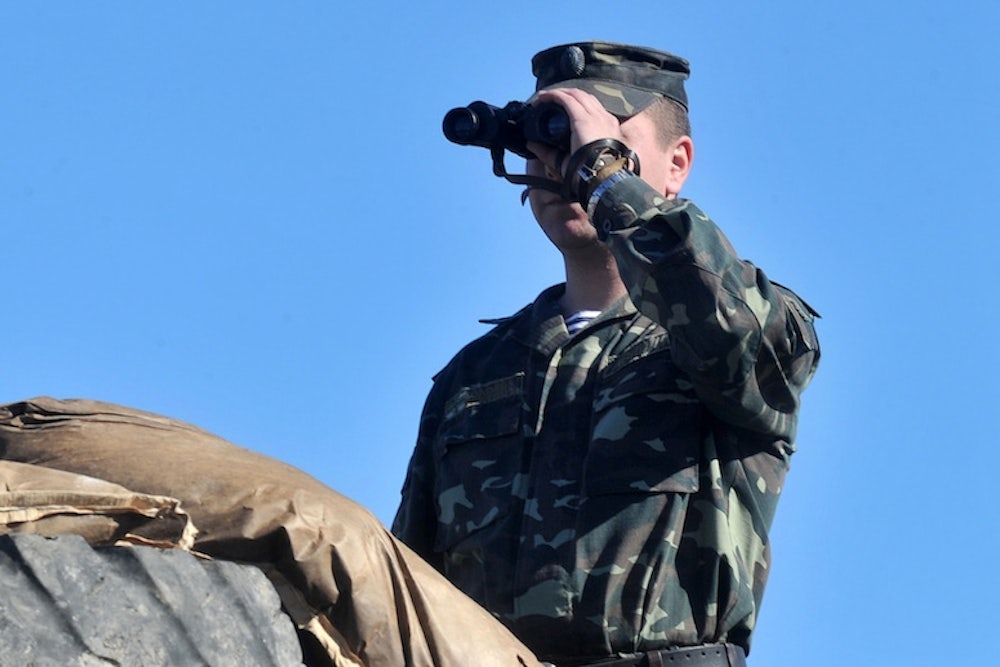Admiration and anger accompany us in these tense, grim hours. We admire the judicious restraint, the determination, and the sense of responsibility displayed by the Ukrainian society and government. And we are filled with anger when we observe the imperial aggression of Russia’s superpower politics toward Ukraine. We are indignant and disgusted by the deceitful, hypocritical, and arrogant rhetoric of Russian politicians, diplomats, and propaganda men. Historic images are coming back to life in Polish memory. Our Foreign Minister, Radosław Sikorski, has observed that "Russia has never actually invaded Poland—instead it always ‘came to help’ national and religious minorities.”
That’s exactly how it was during the reign of Catherine the Great, who extended her protection to religious minorities in the Polish-Lithuanian Commonwealth, essentially in order to carry out the Partitions. That’s how it was in 1920 and 1939, when Russia took the urban and rural working masses and religious minorities under its wing to protect them from the fascist and imperialist regime in Poland. In 1940, the Kremlin hastened to offer “brotherly help” to Latvia, Lithuania, and Estonia—with exactly the same goal. And after the war, they rushed to Budapest in 1956 and to Prague in 1968. Later on “brotherly help” was also bestowed on the people of Afghanistan…
Today, as we look at Crimea, dominated by Russian soldiers and armed Crimean separatists, it is difficult not to recall another politician who was equally ardently concerned with the wellbeing of his countrymen under the thumb of a foreign government. In 1939 Adolf Hitler declared that the Third Reich had to protect “the 10 million Germans living in the neighboring states"; he thus caused jubilation among the Sudeten Germans and gave the go-ahead for a propaganda campaign against Czechoslovakia. In the end, Hitler demanded a plebiscite among the Sudeten Germans, which paved the way for the break-up of Czechoslovakia and its subjugation to the Third Reich. One year later a similar strategy was used against Poland.
The Kremlin has made a careful study of the history of Hitler’s conquest of Czechoslovakia—or so it would seem when one observes the maneuvers in Crimea. I am not sure, however, whether Putin’s tsarist bureaucrats remember the ultimate outcome of Hitler’s policy of defending Germans and the German-speaking population in other states.
Vladimir Putin has revitalized Brezhnev’s doctrine of “limited sovereignty.” He had already applied it in Georgia, and he is using it in Moldova. One might wonder where he will rush in with “brotherly help” next. The Baltic States? Or Kazakhstan, perhaps?
Lenin—an author whose writings Putin has surely read in his KGB courses—used to say that foreign policy is a result of domestic policy. In other words: Vladimir Putin is solving Russia’s problems by creating external tensions. That’s how it was when he came to power on the wave of the Chechen war; that’s how it was during the war in Georgia; that’s how it is now. The specter of the Kiev Maidan is haunting the offices of the Kremlin’s tsarist officials—hence such strong reactions to the anti-war protests in Moscow and St. Petersburg.
Of course, there are judicious people in Russia—also near the Kremlin—who travesty Putin and repeat: Whoever doesn’t long for Crimea has no heart, but whoever wants to break Crimea away from Ukraine has no brain. Unfortunately, chauvinist Russian xenophobia has the upper hand—many in the Kremlin are behaving as if they had no brains—not to mention dignity. The Russian parliament’s moral and political unanimity regarding the use of military force in Ukraine is reminiscent of the epoch of triumphalist manifestations performed for Stalin. And the image of the Russian Ambassador to the U.N., Vitaly Churkin, at the Security Council meeting will one day be used as a classic textbook example of the Putinist school of liars.
Democratic and independent Ukraine has loyal and non-opportunistic friends in Poland. The Polish government is rightly emphasizing the need for international solidarity—and making efforts to secure it. Polish public opinion should stay calm and refuse to give into emotions. We have to be tough but rational. For we should remember: Brezhnev’s Russian superpower arrogance led to aggression against Afghanistan but it was also responsible for the fact that precisely in Afghanistan, during that disgraceful war, the Soviet Empire began to get its teeth knocked out.
Ukraine might be the beginning of Putin’s end.
And today we can say what many Russian democrats are saying: “Какой позор для России…”—What a disgrace for Russia.
Adam Michnik, a leader of the anti-Communist opposition in Poland in the 1970s and 1980s, is the editor-in-chief of Gazeta Wyborcza, where this piece originally appeared. Translated by Agnieszka Marczyk.
Stay informed with The New Republic's Ukraine Newsletter. Sign-up here.
